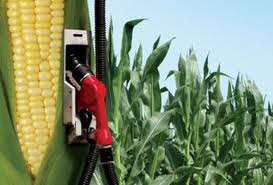Peter Schrappen, Northwest Yachting columnist, NMTA Director of Government Affairs and Executive Director of the Clean Boating Foundation, has written a thought provoking post in the Clean Boating Foundation blog. Many have made the E15 debate about whether or not it’s good for engines or the economy. The better question is whether it’s good for the environment. – KH
March 27, 2013 | by Peter Schrappen
Have you been following the desire by the Federal government to increase the amount of ethanol that comprises gasoline? Currently, the blend with the abbreviation “E10″ is what is allowed. That means that at most 10% of your gasoline may contain ethanol, generally made from corn.
We haven’t discussed this topic much on this blog, but that doesn’t mean that the movement to mandate 15% (or “E15″) of gasoline to contain ethanol isn’t moving along pretty quickly. I’ll let the boating industry speak for itself here and here as to why this could spell disaster for boating engines. As for this blog, and as the first foray into why ethanol is bad public policy from an environmental perspective, you don’t have to look any further than Michael Pollan’s entry here. Michael Pollan, you say, isn’t that the author of the Botany of Desire and the Omnivore’s Dilemma? What bona fides does he bring to the conversation? The thing to note is that Pollan doesn’t bring a vested interest into the conversation. He’s not on the Corn Lobby Board and doesn’t have investments in protecting the status quo. He brings a journalist rigor and leaves a lot of the editorializing out of his work.
Pollan shines a great deal of light on the subject and specifically calls out the reasons that ethanol makes very little sense from an environmentalist point of view. On the surface, moving away from foreign oil with plant fuel should make a lot of sense. And this is at the heart of the Corn Lobby Board’s argument. As with many things, however, the devil is in the details. Peel back the layers and you are left with some pretty stark realities.
Specifically, Pollan points out:
- Corn receives more synthetic fertilizer than any other crop, and that fertilizer is made from fossil fuels — mostly natural gas.
- Corn also receives more pesticide than any other crop, and most of that pesticide is made from petroleum.
- To plow or disc the cornfields, plant the seed, spray the corn and harvest it takes large amounts of diesel fuel, and to dry the corn after harvest requires natural gas.
- By the time your “green” raw material arrives at the ethanol plant, it is already drenched in fossil fuel. Every bushel of corn grown in America has consumed the equivalent of between a third and a half gallon of gasoline.
As they say on the infomercials: but wait, there’s more. By the time the entire ethanol production process is finished, it may take more than a gallon of fossil fuel to produce a gallon of ethanol.
One of the key tenets of the Clean Boating Foundation is that we point out and celebrate market-based solutions whenever we can. Let’s see if ethanol stands up to making good economic sense. By now, you are probably aware that agri-business and the corn industry in particular is heavily subsided by you and me through tax breaks. For every gallon of ethanol, the feds offer a tax break of 54 cents. That’s a lot of free money floating around, which is probably why there’s a maize rush. Pollan goes on to uncover that our government protects domestic ethanol production by imposing a tariff of 54 cents a gallon on imported ethanol. According to the Wall Street Journal, it will cost U.S. taxpayers $120 for every barrel of oil saved by making ethanol. Yikes.
That’s great news for the corn lobby and corn farmers and in particular Archer Daniels Midland and their lobby team. This is very good news indeed for Archer Daniels Midland, the agricultural processing company that controls about 30 percent of the ethanol market.
As gas prices rises, the megaphone for increased ethanol production increases, too. Farmers will be encouraged to grow more corn. Farmers will apply more nitrogen to boost yields (leading to more nitrogen pollution). Soybeans (a crop that builds nitrogen into the soil) will be replaced with corn-on-corn rotation, all the while they are pumping in synthetic nitrogen.
What a mess!
Pollan and CBF aren’t against synthetic fuel. We are against rushing around to produce more synthetic fuel because of a powerful lobbying force. (Remind me why, again, Iowa is the first state to have a Presidential caucus?) That just provides more “fuel” for this loop to keep going, ad infinitum.


